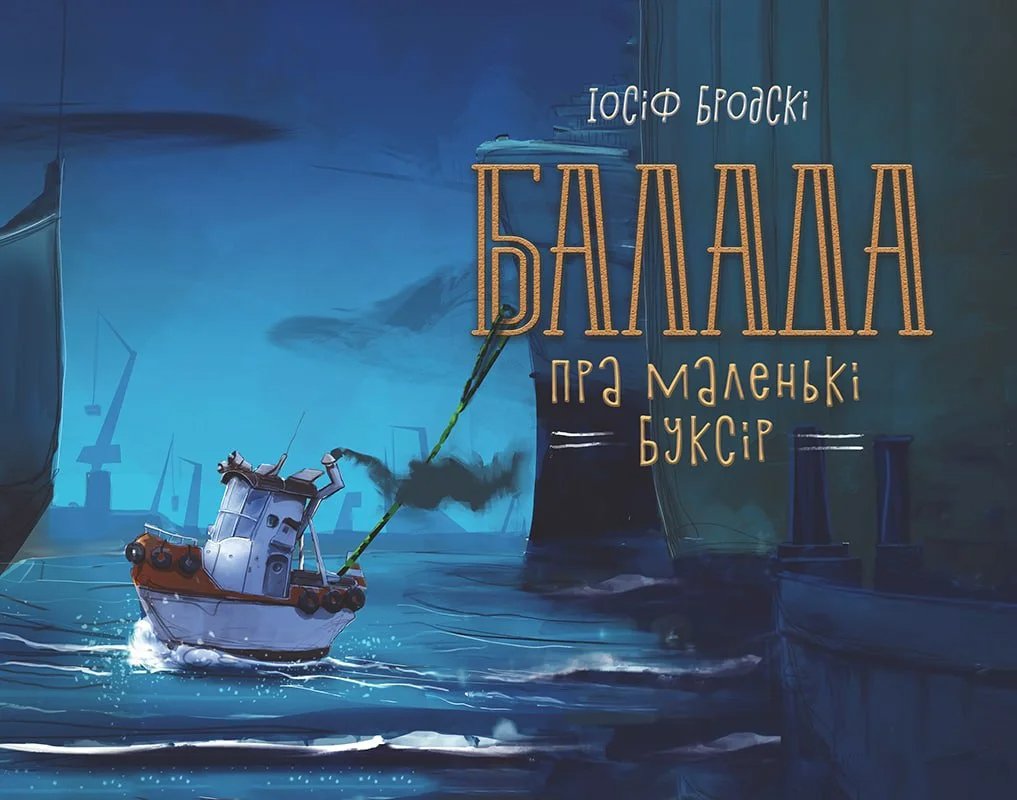Essentially, this is the point when the list of materials deemed extremist by Belarus can be finished. Seeing as nothing else could possibly be added to it. After the Central District Court of Minsk ruled to include Joseph Brodsky’s children’s book Ballad about a Small Tugboat translated into Belarusian on the list of extremist literature, the idea of adding anything else becomes redundant (the court hearing took place on 18 October, however, the book was included on the list on 25 October).
The list itself is almost a masterpiece: the first “extremist material” was a CD with a recording of rock concert Салідарныя з Беларусью (Solidarity with Belarus) that took place in Warsaw in 2006, the last — a children’s poem by Joseph Brodsky. If they understood themselves what they had created, then maybe they would halt their efforts from the joy of witnessing this completeness. But no, they will not stop.
“And then I will sail
past the trees shining blue
to a country of gold
in a beautiful dream.
And as legends have
taught us, from that
country of gold no tugboat
has ever returned,” are the lines from Ballad about a Small Tugboat.
And these are the same lines translated into Belarusian:
“І тады паплыву
між дзівосных я мрой
да цудоўных краёў,
ад каторых яшчэ,
як казалі дзяды,
ніводны з буксіраў
не вярнуўся сюды.”
What a great thing that talented translators exist. What a great thing that Alessya Aleynik decided to translate this children’s poem by Joseph Brodsky, written in 1962 and published in a magazine for school children Kostyor (Campfire), into Belarusian. That was long before Brodsky was accused of social parasitism by the government, with his Nobel Prize being even more years away, but that issue of Kostyor was not pulled from children’s libraries even after Brodsky’s emigration. Because even the last name of the writer could not impact the existence of a beautiful ballad for children, in which a small tugboat that had never left the bay before talked about itself, its work, and its crew — about the captain with a cigarette and about a cook with an amazing ladle in hand. The tugboat is a little bit sad upon seeing ocean liners, the life of which is way more interesting, but it is proud of its work that no one in the bay could do without. Also, the tugboat knows that someday it will sail to a golden country, from which no one returns.

Photo: Telegram
Alessya Aleynik’s translation is just as subtle, delicate, and filled with sadness as the original. The Russian-language version of Ballad about a Small Tugboat was published as a book with illustrations by a great artist Zaven Arshakuni in 1991, before the USSR collapse. The Belarusian version Балада пра маленькі буксір was published in Belarus this year thanks to the work of publishing house Янушкевіч, more precisely its owner and namesake Andrey Yanushkevich. He’s been publishing good books in Belarusian for a long time. One could say that his publishing house logo is a sign of excellent quality. He published Brodsky’s poem as a 40-page book with beautiful illustrations by Belarusian artist Yagor Yascheni. Now, when one enters the name of the book into a search bar of any Belarusian bookstore website, the well-known “this page doesn’t exist” appears.
Actually, Andrey Yanushkevich used to own a bookstore too, in which this book was being sold before it had been deemed extremist. The book lay on the counter for a whole half a day — Yanushkevich’s bookstore Кнігаўка (Bookcase) was opened and closed on the same day, 16 May.
Immediately after the bookstore was opened, propagandists came in for a visit — Ryhor Azaronak from Belarusian TV channel CTV (the person infamous for the noose hanging in his studio) and Liudmila Gladkaya from newspaper Sovetskaya Belorussiya-Belarus Segodnya. Provocation was clearly the reason for the visit: Azaronak and Gladkaya asked Yanushkevich who had won the Belarusian presidential election. Yanushkevich said: officially it was Lukashenka, my personal opinion I will keep to myself. Azaronak kept pushing: “And you, with your personal opinion in regards to the election, will be publishing books and selling them here?” He was outraged by the fact that a book on Belarusian history in English was being sold in the bookstore.
Later, Gladkaya accused Yanushkevich of ideological diversions on her Telegram channel; in the afternoon, law enforcement agents came to the store with a search warrant. Over 200 books were seized (they said it was for a forensic examination, with the Brodsky book was one of the 200), while Andrey Yanushkevich and another employee of the publishing house, literary critic Anastasiya Karnackaya, were detained. The publisher was arrested for ten days, then for another ten, then for eight. Anastasiya spent 23 days behind bars. Belarus’ Main Directorate for Combating Organised Crime and Corruption (GUBOPiK) even published its first Telegram post in Belarusian in relation to this case: about enemies of the people that had been urging citizens to storm the streets [for protests] in August 2020, and have now tried to open a bookstore that sold extremist and Nazi literature.
Earlier, in February 2022, the publishing house was asked to urgently vacate its office. Back then, Andrey Yanuskevich announced a booksale, and queues lined up in front of the publishing house. I do not know how many copies of Балад пра маленькі буксір were sold that day. But I can say with certainty that those who bought this book will now be hiding it in a secure place and be happy that they managed to add such a rarity to their home library.
This is what publisher Andrey Yanushkevich wrote in a post on the Кнігаўка Telegram channel on 25 October:
“Ballad about a Small Tugboat by Joseph Brodsky was recognised as extremist. On 16 May, when GUBOPiK agents came to Кнігаўка and started seizing books, I asked the chief what was wrong with a book written by a Nobel laureate. A children’s poem published in 1962, with the text that has nothing to do with Belarus… In response, I was told that the colour of the tugboat on the illustration aroused suspicion. The entire time neither I nor anyone else who had anything to do with the publication even thought to associate the image of a deep orange tugboat with our national symbols. Neither were such ideas expressed by our customers, even jokingly. I didn’t see any mention of this on social media either. The first person to see a threat for the Belarusian regime in the illustrations was the aforementioned GUBOPiK agent. It seemed that the story would end on this absurdity. But it’s easier [for them] to embarrass themselves in front of the whole world. The paranoia is growing.”
Andrey Yanushkevich is safe now, he is no longer in Belarus. Small Tugboat is on the list of extremist materials. Its author Joseph Brodsky is buried in a Venice cemetery. The judge who ruled to recognise a children’s poem as extremist is in their comfortable office. The GUBOPiK agents who trashed the Кнігаўка bookstore are scouring Minsk and other Belarusian cities, searching for new extremists. And all of them make up pieces of the puzzle that is today’s absurd and terrifying world.
“Sail away from home
into white morning light
and give my regards
to the native ocean of ours.
You disappear in the distance,
this is not our first goodbye.
Someone has to remain
by this land of mine.”
(Joseph Brodsky, Ballad about a Small Tugboat)
Someone has to, of course. But it seems that only small tugboats from children’s books are capable of doing so.
Join us in rebuilding Novaya Gazeta Europe
The Russian government has banned independent media. We were forced to leave our country in order to keep doing our job, telling our readers about what is going on Russia, Ukraine and Europe.
We will continue fighting against warfare and dictatorship. We believe that freedom of speech is the most efficient antidote against tyranny. Support us financially to help us fight for peace and freedom.
By clicking the Support button, you agree to the processing of your personal data.
To cancel a regular donation, please write to [email protected]

